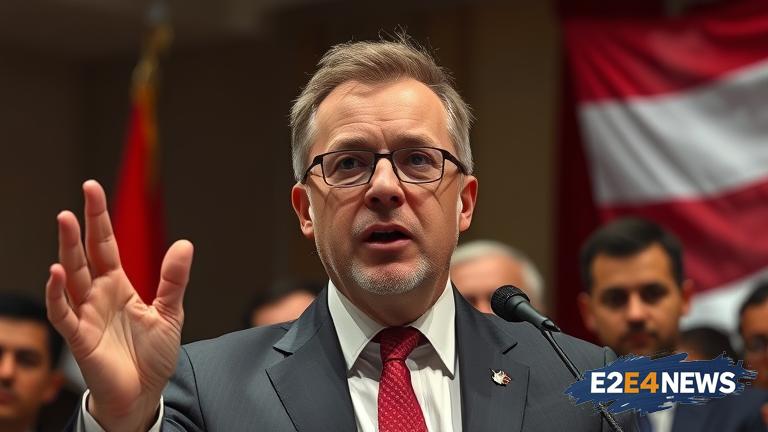The incident has sparked widespread outrage and condemnation from various quarters, with many calling for greater action to be taken against hate speech and discrimination. The councilor, who has not been named, made the comments on social media, where they referred to Jews and homosexuals using derogatory language. The comments were widely shared and condemned, with many calling for the councilor to be held accountable for their actions. The FPÖ has since announced that the councilor has been expelled from the party, citing a zero-tolerance policy towards hate speech and discrimination. The party’s leader, Herbert Kickl, has also condemned the comments, stating that they have no place in the party or in society as a whole. The incident has highlighted the ongoing issue of hate speech and discrimination in Austria, with many calling for greater action to be taken to address the problem. The country has seen a rise in anti-Semitic and homophobic incidents in recent years, with many blaming the rhetoric of far-right politicians for contributing to the problem. The FPÖ has faced criticism in the past for its handling of hate speech and discrimination, with some accusing the party of not doing enough to address the issue. The party has denied these allegations, stating that it is committed to fighting against hate speech and discrimination in all its forms. The incident has also sparked a wider debate about the role of social media in spreading hate speech and discrimination. Many have called for social media companies to do more to tackle the problem, with some arguing that they have a responsibility to remove hate speech and discriminatory content from their platforms. The Austrian government has also faced criticism for its handling of the issue, with some arguing that it has not done enough to address the problem. The government has announced plans to increase funding for initiatives aimed at combating hate speech and discrimination, but some have argued that more needs to be done. The incident has also highlighted the importance of education and awareness-raising in combating hate speech and discrimination. Many have argued that greater efforts are needed to educate people about the dangers of hate speech and discrimination, and to promote tolerance and understanding. The FPÖ’s expulsion of the councilor has been seen as a positive step, but many have argued that more needs to be done to address the underlying issues. The party has announced plans to increase its efforts to combat hate speech and discrimination, but some have argued that these efforts do not go far enough. The incident has sparked a wider debate about the role of politicians in promoting tolerance and understanding, with many arguing that they have a responsibility to set a positive example. The FPÖ’s leader, Herbert Kickl, has faced criticism for his handling of the issue, with some arguing that he has not done enough to condemn hate speech and discrimination. The party has denied these allegations, stating that it is committed to fighting against hate speech and discrimination in all its forms. The incident has also highlighted the importance of holding politicians to account for their actions, with many arguing that they should be held to higher standards than ordinary citizens. The FPÖ’s expulsion of the councilor has been seen as a positive step, but many have argued that more needs to be done to address the underlying issues. The incident has sparked a wider debate about the role of social media in promoting tolerance and understanding, with many arguing that it has a responsibility to promote positive and respectful dialogue. The Austrian government has also faced criticism for its handling of the issue, with some arguing that it has not done enough to address the problem. The government has announced plans to increase funding for initiatives aimed at combating hate speech and discrimination, but some have argued that more needs to be done.
